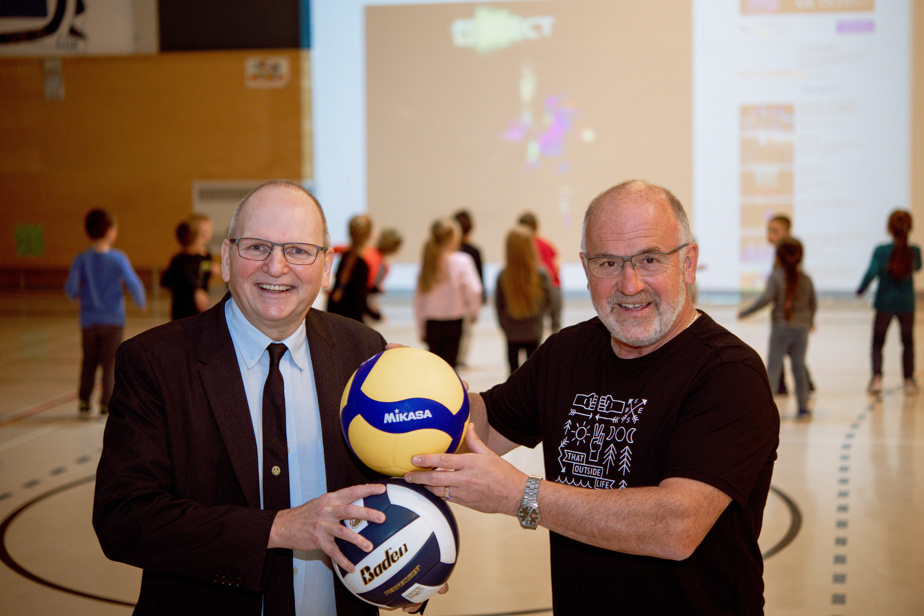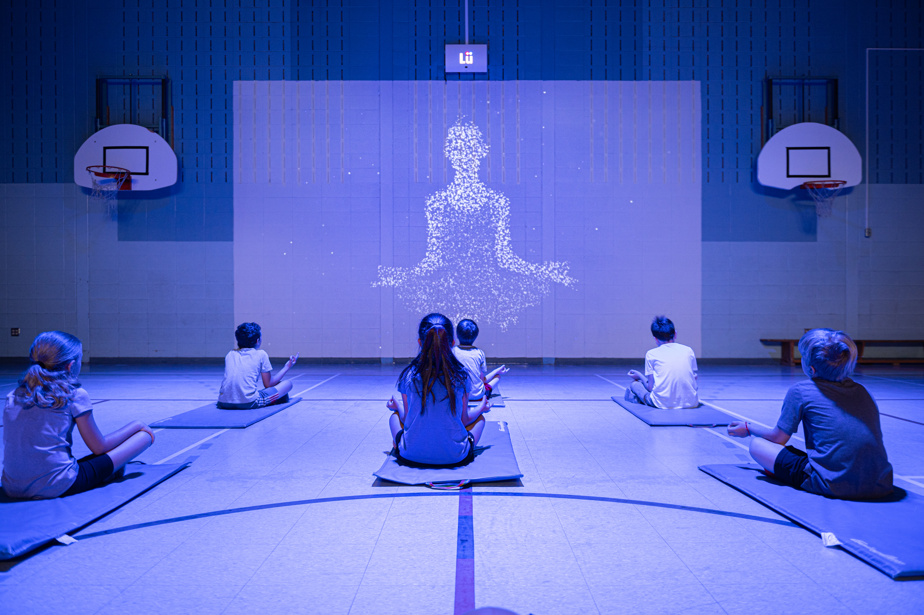On November 9, Telus, the Telus Foundation for a Better Future and a coalition of several partners donated $350,000 to distribute 10 Lü Systems, an audiovisual and immersive technology, to schools in the Lower North Coast through the Dr. Camille-Marco Foundation.
600 young people from isolated communities and Inu areas in the region can learn, explore and move through a virtual environment that connects them together and through activities that contribute to the development of their social, emotional, physical and intellectual skills.
This significant contribution, which includes $100,000 from Telus and $100,000 from the Telus Foundation for a Better Future, comes after Telus’ 5G and 4G LTE network was deployed in the Lower North Shore earlier this year. For the first time, 2,000 families in the region have been connected to high-speed internet and mobile phones. Carried out in collaboration with the Governments of Canada and Quebec as well as the Société du Plan Nord, this initiative is one of Telus’ largest digital infrastructure projects north of the 49th parallel to date, and makes it possible to counteract isolation by connecting the Loire North Shore and its businesses, health centers and schools to the rest of the world .
“We are very grateful for the donation made by Telus and the Telus Foundation for a better future,” said Vincent Junkas, President of the Dr. Camille Marco Foundation. “Since the arrival of high speed, teaching has become easier and more stimulating, and our youth now have the same advantages as other students elsewhere in Quebec. From Blanc-Sablon to Kegaska, Lü systems transform our classrooms into interactive spaces where young people can swing their hips on The sound of music, high jump practice, endless exploration of the universe or the abyss of the sea floor. As if they were there. A whole new world of information and possibilities is open to them.”
Photo provided by LÜ
Interactive play area Lü.
Lü systems use virtual learning spaces thanks to a giant wall projection, 3D camera, lighting and sound system. With high speed, young people from isolated villages on the Lower North Shore will be connected to Lü’s virtual community, and they will be able to interact with classrooms from all over the world. Lü’s environments will also be accessible to citizens of all remote communities on the Lower North Shore, creating a circle of connections between young and old, bringing generations and cultures together from one end of the country to the other.
“Our award-winning mobile network and immersive Lü technology are creating bridges of connections, breaking isolation and broadening the horizons of all generations in the Lower North Shore,” says Marie-Christine Damore, Consumer Solutions and Telus Customer Experience in Quebec. With today’s announcement, we connect our long-standing commitment to spreading our networks in Quebec, no matter where they live, to our desire to create a better future for communities and their youth who can achieve their full potential. We are also proud to be able to bring together a coalition of partners who have used innovation for the ambitious deployment of our technologies in the Lower North Shore, and who have also responded to the call to give back to local communities. ”
Since 2000, Telus and the Telus for a Better Future Foundation have donated $82 million to charities in Quebec, and its team members have volunteered 1.2 million hours. Founded in 2018, Telus for a Better Future connects young people to a world of possibilities by supporting charities that deliver programs focused on health and education to help at-risk youth thrive in a digital world. Last year, the Foundation’s Community Investment Committee and the 13 Telus Committee donated $8.9 million to 607 registered charities to help more than 6 million marginalized Canadians.
Six partners have joined the project together with Telus and the Telus Foundation for a Better Future: IT2go, Littoral School Service Center, Tshakapesh Institute, WesTower Communications, Nokia and Madysta companies.
“Lü turns play areas into magical worlds for children,” confirms Tommy Bouvard, Head of IT2go, Lü Partner – Aire de jeux Interactive. A 3D camera and sound and light systems create giant tactile projections on the walls, where young people dive to learn, move and have fun using hundreds of activities and apps. For example, they can throw balloons at the correct answer in a friendly mental arithmetic contest or become the heroes of a video game that allows them to explore unknown worlds. Sports, Math, French, Agility or Music: we make sure to offer games that are adapted to all students. ”
“The access to high-speed Internet has provided teachers and students with additional tools to improve the educational experience offered in schools located in the Lower North Shore. Education platforms that were previously inaccessible are now used on a daily basis by Before our students High-speed internet is reliable and breaks down geographical barriers giving our youth an equal opportunity to learn and develop We are pleased to be able to participate in this exciting collective project with a contribution of $45,000 Thus, we are taking education to new levels, thanks to the introduction of interactive tools such as Lü systems that are now in use in the gymnasiums of all schools of the scolaire du Littoral Service Center.”
“In the context of opening up to the world, the Tshakapesh Institute provides high-quality services to communities in the areas of language, culture and education to enhance the success of each student,” said Tina Vassiliu, Director of Research, Development and Innovation at Chakapesh University. Chakabish Institute. Not only will Lü’s systems allow our youth to learn, but technology will bring us closer to the communities of the Lower North Shore, among others, becoming a vehicle for transmitting and sharing the culture of Innu. From one Lü system to another, the digital road will connect us together over a distance of more than 400 kilometres, from Kegaska to Blanc-Sablon. ”
“We are excited to be involved in creating the infrastructure for this exciting project, but also to donate $25,000 to the Dr. Camille Marco Foundation,” said Nathan Schwert, President and CEO of WesTower Communications. Our team has spared no effort to work with Telus to roll out the high-speed mobile network in the Lower North Shore. The inclement weather has defied and proficiently met the logistical challenges of this isolated region, particularly in
Transportation of equipment by boat and helicopter. Supporting youth education in the Lower North Shore was the logical next step in WestTower’s commitment to promoting the economic development of this area and connecting the communities that live there. ”
“To provide high-speed connectivity to the Lower North Shore, Nokia and Telus have deployed one of the largest and most advanced microwave systems in the world,” said Jeffrey Maddox, President of Nokia Canada. In addition to cell phone support and internet access services in the region, our technology helps provide students with educational opportunities that enable them to excel on a global scale. We are pleased to be involved in this important community development project and to donate to the Dr. Camille Marco Foundation. ”
Yvan St-Arnaud, President of Madysta, asserts that “Deploying high speed over the vast, roadless land of the Lower North Shore remains to this day one of the most ambitious projects we have been involved in.” We are pleased to donate $10,000 to deploy Lü Systems in schools on the Lower North Shore and to make a significant positive impact on young people’s academic success. ”
To learn more about Lü systems, visit play-lu.com. For more information about the Telus Foundation for a Better Future, visit futurmeilleur.com.
Telus is committed to making significant progress on the path of reconciliation. To learn more about our commitments and procedures, click here.
The mission of the Dr. Camille Marco Foundation is to ensure the development of the Lower North Coast in the social, health and educational fields, in particular by supporting local organizations and CISSS (Integrated Health Center and Social Services) in projects aimed at improving the services provided to residents. The Foundation also supports human resource development in the Lower North Shore by offering scholarships based on academic perseverance.
Founded in 2018, Telus for a Better Future funds programs, services and technologies for registered charities in Canada that help vulnerable communities, especially young people. Each year, the Foundation awards more than 500 grants and assists more than two million Canadians at risk.
Last year, Telus for a Better Future pledged $10 million in emergency assistance to support and strengthen the capacity of the public health system, as well as community response across Canada. Cette aide financière pourra notamment servir à l’achat de nouvelles technologies et de nouveaux équipements médicaux, tels que des respirateurs, et accroître le soutien aux initiatives en santé mentale et aux programs de nesola personécurité auxé dé aire Remotely. Among its current priorities, the Telus for a Better Future Foundation intends in particular to support charities that assist at-risk youth through programs focused on health, education and technology.
Telus is a leading global communications technology company, with annual revenues of $16 billion and 16 million customer connections for its mobile, data, communications, voice, IP, television, video, entertainment, and security services.
True to the company’s community philosophy, “We give where we live,” Telus team members, current and retired, have donated more than $820 million and 1.6 million days of volunteering to the community since 2000.





